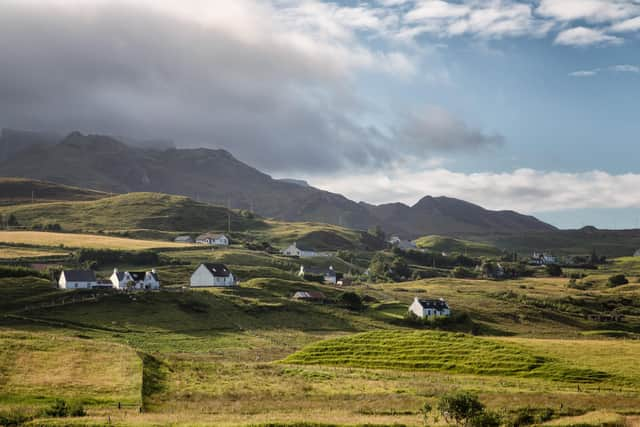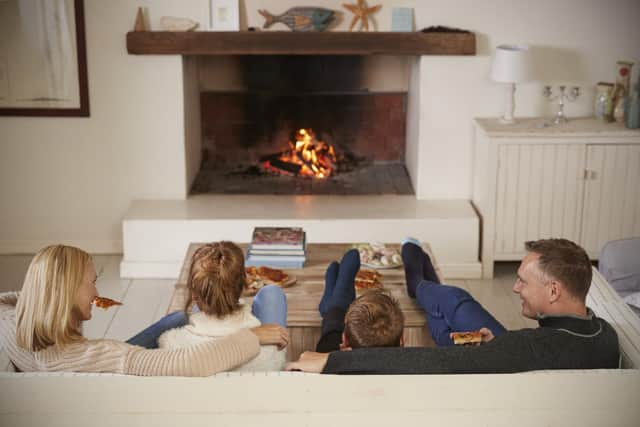Highland and island Scots could ‘freeze or starve’ as remote homes face highest bills
“People will die” if support is not urgently put in place, according to Scotland’s leading help service for people struggling with debt.
Grace Remmington, of Citizens Advice Scotland, said: “They will freeze or they will starve.”
Advertisement
Hide AdAdvertisement
Hide AdRhoda Grant, Labour MSP for the Highlands and Islands, says she is already hearing of people being admitted to hospital because they are starving.
“If that’s what’s happening now, it’s going to be ten times worse in the winter,” she said.
Scottish ministers have said they are treating the situation as a “public emergency”.
The concerns come as UK energy regulator Ofgem raised the energy price cap to £3,549 a year from 1 October – an increase of 80 per cent compared to April’s level.


Further rises are forecast, with predictions suggesting annual costs for the average home could jump to more than £5,000 in January and potentially £6,000 next April.
Householders in the Highlands and Islands and other rural places already pay the most for goods and services and suffer the highest levels of fuel poverty in the UK.
A Scottish Government report estimates the minimum cost of living in remote rural Scotland is between 15 per cent and 30 per cent higher than in urban parts of the UK – more in some places.
People living far from towns and cities are more dependent on electricity and alternative fuel sources for heat because they have no connection to the gas grid and rely heavily on private cars for transport.


Average incomes are also lower.
Advertisement
Hide AdAdvertisement
Hide AdGrace Remmington, of Citizens Advice Scotland, said: “Everybody is being affected by the high fuel bills right now, but people in rural areas face particular challenges.
“Many rural households are not connected to mains gas and rely on expensive alternatives such as oil or LPG (liquid petroleum gas).
“Households without mains gas are more likely to be in fuel poverty and off-gas fuel prices are not regulated.
“The further north you go, the colder and wetter it is, and in addition rural areas tend to have older, less efficient housing so people need to use more energy to stay warm and well.
“It’s important to understand that fuel poverty rates were already high even before the current energy cap crisis.
“We’ve been very clear that, unless the government give people more help, people will die this winter.
“They will freeze or they will starve.
“It is important to make sure rural communities aren’t forgotten in the energy crisis.”
The energy price cap is based on the average UK home with dual fuel – 20 per cent electricity and 80 per cent gas – but rural properties relying on oil for heating face much bigger bills.
Advertisement
Hide AdAdvertisement
Hide AdThe cost of oil, or kerosene, has jumped from around 43p per litre a year ago to around 98p a litre now, with a four-bedroom home using two to three 1,000-litre tanks annually – with refills usually paid for up front.
And there is no cap on the cost to customers, with prices at the mercy of international markets.
Scottish energy secretary Michael Matheson says the latest cap “imposes a burden that customers simply cannot be expected to carry”.
He said: “The only acceptable course of action now is for the UK government, who have the necessary policy levers and borrowing powers at their disposal, to take immediate steps to cancel the increase for all households.”
Ms Grant says she has been hearing dreadful stories from organisations and charities working with people who are already suffering hardship, with many cutting down on food and heating and falling into debt in a bid to get by.
People are “worried sick”, she said.
“Food banks have already given out more food parcels this year than they did the whole of last year.
“I’m trying not to scare people, because there are many whose mental health is being impacted because they’re afraid – they’re maybe just coping now but they’re thinking if this gets worse they can’t.
“So we’ve got physical and mental health troubles coming down the road, which then falls back on services.
Advertisement
Hide AdAdvertisement
Hide Ad“It’s going to cost the people and the public purse to deal with it.”
She called on the Scottish and UK governments to step in urgently to help rural households and vulnerable citizens.
“Surely prevention is better than cure,” she said, “to help people out now and let them know they’re going to get help so they don’t worry about it, and can take steps.
“They need to know they’re not going to be left on their own coping with it.”
Fears have been echoed by Shetland MSP Beatrice Wishart, of the LibDems, who is deeply concerned there could be enduring consequences for the younger generation.
“You read in history books of people growing up in dreadful poverty and deprivation,” she said.
“It’s awful that this is the case in 2022.
“It’s very hard to see children happy, healthy and thriving in a cold home with not enough to eat.
“I’m fearful for youngsters growing up in these dire circumstances.
Advertisement
Hide AdAdvertisement
Hide Ad“There will be an impact on them immediately, but also in the long term – it will have lasting repercussions.”
The MSPs have joined wider calls for reform of the energy market.
Di Alexander is chair of the Highlands & Islands Housing Associations Affordable Warmth Group, which lobbies on fuel poverty issues.
He said: “There’s a lot to be worried about. The energy system is broken.”
He has accused Ofgem of “failing vulnerable groups” and criticised the government’s £400 handout to every household.
He says creation of a ‘social tariff’, supplying energy at a discounted rate to the poorest homes, would provide targeted action and immediately alleviate some of the worst pressures for people struggling to pay.
“It’s fairly obvious who is going to suffer most,” he said. “The costs are going to hit the poorest the hardest. They don't have any wiggle room. We know people are already turning their heating off.
“Cutting energy use is one of the few things you can do to save money, so people are going to switch off and go cold – suffering all the damaging health and welfare effects that brings.
Advertisement
Hide AdAdvertisement
Hide Ad“First and foremost is to get help to households that need it most.”
Mr Matheson said the Scottish Government would do “everything” it could to mitigate the effects for consumers.
An extra £1.2m of funding for energy advice services was announced on Thursday, while a £2m Social Housing Fuel Support Fund is set to open this week.
“Our foremost concern is for those in or at risk of fuel poverty and it is imperative that those worried about or struggling with heating their homes access the information and support they need to reduce their energy bills,” he said.
“No single government, company or organisation can solve this crisis alone.
“It requires a collective response commensurate to the situation.
“We will continue to work with our partners, energy companies and stakeholders to do everything we can to help the people of Scotland through this deeply unsettling time.
“We will also continue to press the UK government to reform the energy market to prevent this situation occurring again in the future.”
Comments
Want to join the conversation? Please or to comment on this article.